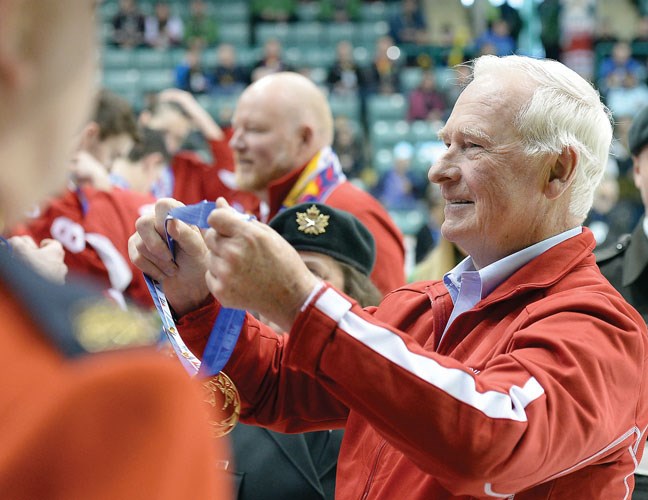If the Canada's governor general could tell athletes to take any one thing away from their Canada Winter Games experience, it would be to appreciate the moment.
"I think the great joy of participating in a Canada-wide contest and having worked so hard to get here and to take that away as a memory that they will carry with them all their life - and seeing another part of Canada which is such a special, special community," said David Johnston, who arrived in Prince George Sunday to speak at the closing ceremonies - and declare the 18-day event officially closed.
"It puts spotlight on sport for the whole nation, particularly for young people," he said of the Games and invoked Aristotle's aphorism: "healthy mind, healthy body."
"The two go together," he said.
Johnston, a former hockey player at his alma mater Harvard, was named to the university's Athletic Hall of Fame. He was also in the CN Centre stands Sunday to watch Ontario defeat Alberta for the gold in men's hockey.
"The only thing I'm so struck about (the Canada Winter Games) is the role of volunteers," Johnston said, referencing the estimated 4,000 volunteers involved, calling it an "extraordinary achievement and wonderful for the community.
"Sport, I think, brings the community together."
Johnston had a long career as a professor and then president of the University of Waterloo before becoming the representative of the Queen in Canada in October 2010.
Not surprisingly, Johnston has identified learning and innovation as one of his focuses during his time as governor general.
Learning, he says, is integral "for the rights of individuals to do what they want, to realize the dreams that they ought to have, to have the freedom to develop."
The broad theme of his mandate is to build a "smart and caring nation."
The two words, he said, "reinforce one another" and pointed to his pillars of learning and innovation, family and children, volunteerism and philanthropy.
"I think each of them contributes to the other and the objective, really, is to ensure that Canada is a country for everyone, that it continues to be a very inclusive country that it's a country of equality of opportunity where any person in Canada can succeed to the limits of their talent," he said.
"We have a ways to go in that respect - our equality of opportunity is not shared particularly in the northern communities, particularly in our first nations and aboriginal communities."
Johnston recently addressed a teacher's conference in Nunavut via video conference and on Monday, he is headed to Haida Gwaii.
"You don't know Canada if you don't know the north," said Johnston, adding he is heartened to see the gap in knowledge closing between northern and southern communities.
"Modern information technology has made such a great difference in bringing those communities to areas in the south and bringing the south to them and they help as Canadians to realize we're a nation from sea to sea to sea."
Johnston will speak at the Prince George Playhouse Monday at 10:30 a.m. The event is organized by UNBC and the City of Prince George to discuss the interplay between the two.
"It's a very synergistic relationship," Johnston said. "Good universities build good communities and good communities build good universities."



